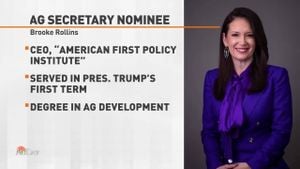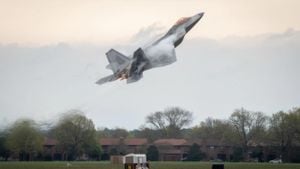Airports and highways across the United States are gearing up for what is projected to be the busiest Thanksgiving travel period on record. With nearly 80 million Americans expected to travel 50 miles or more from home between now and next Monday, the logistics involved could push infrastructure to its limits. Compounded by anticipated weather challenges and service disruptions like strikes, many families hope their journeys will be smooth sailing but prepare for potential hurdles.
The American Automobile Association (AAA) forecasts heavy travel, with most Americans opting to drive, especially as gas prices have decreased slightly since last year. The current nationwide average is around $3.06 per gallon, down from $3.27. Airlines are bracing for impact as well, with the Transportation Security Administration (TSA) expecting to screen approximately 18.3 million travelers at U.S. airports. On the busiest days, particularly the Sunday after Thanksgiving, numbers may soar to over 3 million, which could break previous high records.
Despite the surge, challenges are looming on the horizon. For one, strikes by airport service workers at Charlotte Douglas International Airport—which ranks ninth among U.S. airports by passenger volume—could bring delays and cancelations. A walkout initiated by the Service Employees International Union (SEIU) at 5:00 AM on the Monday of Thanksgiving week demands respect and higher wages for employees who clean planes and assist travelers. Reports indicate these workers often make between $12.50 and $19 per hour, prompting calls for changes to what they label as poverty wages.
It’s not just Charlotte facing upheavals. Striking workers at Los Angeles International Airport are planning to rally for improvements too. These actions contribute to growing tensions as airports across the United States brace for monumental crowds and heightened security protocols. The hope is for prioritizing workers’ conditions alongside accommodating the influx of holiday travelers.
Weather forecasts add another layer of complexity to thanksgiving travel. Multiple storm systems are expected to sweep across the country, bringing rain and snow. Already, the FlightAware tracker showed thousands of flights canceled or delayed. The situation remains precarious, especially for the Midwest, where ice and snow have hindered travel plans—transforming what was once supposed to be festive reunions with loved ones potentially chaotic and stressful encounters.
Even airport authorities are alerting travelers to expect longer waits and crowded terminals during peak periods. Airport officials recommend arriving two to three hours early. TSA’s Administrator, David Pekoske, has assured travelers, stating, "This will be the busiest Thanksgiving ever. Fortunately, our staffing is also at the highest levels they have ever been. We are ready."
The late date of Thanksgiving this year—November 28—means the traditional travel schedule is impacted considerably, as many people may choose to leave earlier and return around the same time, leading to increased congestion on the roads.
Another key concern is the staffing crisis among air traffic controllers, with the Federal Aviation Administration (FAA) confirming special measures would be necessary if staff shortages arise, likely at major facilities like those near New York City and Florida. The last year's Thanksgiving saw fewer than 400 cancellations, so there are hopes the experience could repeat this year but with the unpredictability of the current weather forecasts, things could easily shift.
For travelers, the best tips may come down to planning. Preparing for weather, allowing ample time for security, and staying hydrated are simple yet effective ways to navigate the potential chaos. Anxiety levels, too, are high as many prepare for lengthy commutes and crowded spaces.
Despite these foreseen challenges, the spirit of Thanksgiving shines brightly for many, igniting their motivation to reach loved ones, basking in the priceless connections formed and the memories created during this time. One traveler, reflecting on past experiences, advised fellow holiday-goers to remain patient and checked the weather frequently. Acknowledging the post-pandemic travel environment, AAA's spokesperson noted shifting patterns where people combine work with vacation, leading to variable schedules for those heading home.
Travelers also face advice to mark specific hours less favorable for travel. For example, Tuesday and Wednesday afternoons are predicted to experience heavy congestion, with smoother traffic projected for Thanksgiving Day itself. Notably, technological tools like weather tracking apps can be life-savers when it’s time to head to the airport or hit the road.
Striking workers and adverse weather challenges present significant hurdles for this Thanksgiving travel season. Yet, the coming week presents moments of relief and connection, which might just outweigh the stress. With roadmaps and boarding passes at the ready to face the travel storm, there lies the hope for fruitful journeys and fulfilling family reunions.



